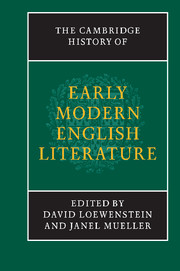Book contents
- Frontmatter
- Introduction
- 1 Modes and means of literary production, circulation and reception
- 1 Literacy, society and education
- 2 Manuscript transmission and circulation
- 3 Print, literary culture and the book trade
- 4 Literary patronage
- 5 Languages of early modern literature in Britain
- 6 Habits of reading and early modern literary culture
- 2 The Tudor era from the Reformation to Elizabeth I
- 3 The era of Elizabeth and James VI
- 4 The earlier Stuart era
- 5 The Civil War and Commonwealth era
- Chronological outline of historical events and texts in Britain, 1528–1674, with list of selected manuscripts
- Select bibliography (primary and secondary sources)
- Index
- References
6 - Habits of reading and early modern literary culture
from 1 - Modes and means of literary production, circulation and reception
Published online by Cambridge University Press: 28 March 2008
- Frontmatter
- Introduction
- 1 Modes and means of literary production, circulation and reception
- 1 Literacy, society and education
- 2 Manuscript transmission and circulation
- 3 Print, literary culture and the book trade
- 4 Literary patronage
- 5 Languages of early modern literature in Britain
- 6 Habits of reading and early modern literary culture
- 2 The Tudor era from the Reformation to Elizabeth I
- 3 The era of Elizabeth and James VI
- 4 The earlier Stuart era
- 5 The Civil War and Commonwealth era
- Chronological outline of historical events and texts in Britain, 1528–1674, with list of selected manuscripts
- Select bibliography (primary and secondary sources)
- Index
- References
Summary
My subject is the consumption and production of vernacular literature in early modern England – of epic and romance, of history and pamphlet, of song and sonnet, ode and epistle, satire and epigram – and more especially the ways in which habits of reading created a field of expectations in which literature was imagined and into which texts were issued. I want to begin, however, with a personal letter, and not a canonical literary text, because the letter touches on both the production and consumption of literature, and at a number of points. In December of 1614, shortly before he took orders, John Donne wrote to Sir Henry Goodyer for help in retrieving his scattered verse, not exactly, it turns out, because Donne was ashamed of his literary vocation – though there is a sense of valediction in the letter that covers Donne’s secular writing – but rather to secure scattered manuscript copy with a view to print publication. Donne had been contemptuous of print and was aware that others knew of that contempt, but necessity pressed him, and the appeal to Goodyer points not only to the dilemmas and desires of a poet, c. 1600, but also to the merits of script and print, the status and uses of verse, and the ways in which poems and letters might be read and remembered:
One thing more I must tell you; but so softly, that I am loath to hear myself: and so softly, that if that good Lady [the Countess of Bedford] were in the room, with you and this Letter, she might not hear. It is, that I am brought to a necessity of printing my Poems, and addressing them to my L. Chamberlain. This I mean to do forthwith; not for much publique view, but at mine own cost, a few Copies. I apprehend some incongruities in the resolution; and I know what I shall suffer from many interpretations: but I am at an end, of much considering that …By this occasion I am made a Rhapsoder of mine own rags, and that cost me more diligence, to seek them, than it did to make them. This made me aske to borrow that old book of you, which it will be too late to see, for that use, when I see you: for I must do this, as a valediction to the world, before I take Orders. But this is it, I am to aske you; whether you ever made any such use of the letter in verse, A nostre Countesse chez vous, as that I may not put it in, amongst the rest to persons of that rank; for I desire very very much, that something should bear her name in the book …I pray tell me as soon as you can, if I be at liberty to insert that: for if you have by any occasion applied any pieces of it, I see not, that it will be discerned, when it appears in the whole piece. Though this be a little matter, I would be sorry not to have an account of it, within as little after New years tide, as you could.
- Type
- Chapter
- Information
- The Cambridge History of Early Modern English Literature , pp. 170 - 198Publisher: Cambridge University PressPrint publication year: 2003
References
- 1
- Cited by

